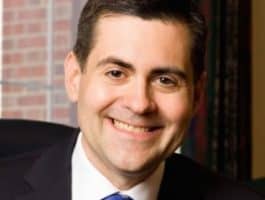
Engaging Your Community
How are you being salt and light to the culture? Christian author and blogger Russell Moore, along with Pastor Larry Osborne, talk about the downside of cultural Christianity. Afraid of being seen as abnormal in the culture, many of us heed the cultural norms rather than following Christ. Larry and Russell remind parents that little eyes are watching, and how parents live out their faith is likely how their children will live it out too.
Show Notes
About the Host
About the Guest
-
How are you being salt and light to the culture? Christian author and blogger Russell Moore, along with Pastor Larry Osborne, talk about the downside of cultural Christianity. Afraid of being seen as abnormal in the culture, many of us heed the cultural norms rather than following Christ. Larry and Russell remind parents that little eyes are watching, and how parents live out their faith is likely how their children will live it out too.
-
Dave and Ann Wilson
Dave and Ann Wilson are hosts of FamilyLife Today®, FamilyLife’s nationally-syndicated radio program. Dave and Ann have been married for more than 38 years and have spent the last 33 teaching and mentoring couples and parents across the country. They have been featured speakers at FamilyLife’s Weekend to Remember® marriage getaway since 1993 and have also hosted their own marriage conferences across the country. Cofounders of Kensington Church—a national, multicampus church that hosts more than 14,000 visitors every weekend—the Wilsons are the creative force behind DVD teaching series Rock Your Marriage and The Survival Guide To Parenting, as well as authors of the recently released book Vertical Marriage (Zondervan, 2019). Dave is a graduate of the International School of Theology, where he received a Master of Divinity degree. A Ball State University Hall of Fame quarterback, Dave served the Detroit Lions as chaplain for 33 years. Ann attended the University of Kentucky. She has been active alongside Dave in ministry as a speaker, writer, small-group leader, and mentor to countless wives of professional athletes. The Wilsons live in the Detroit area. They have three grown sons, CJ, Austin, and Cody, three daughters-in-law, and a growing number of grandchildren.
-

Larry Osborne
Larry Osborne has served as a Senior Pastor at North Coast Church in Vista, California since 1980. The church has grown from 128 to over 11,000 in weekend attendance, and has been honored as one of the ten most influential churches in America for its pioneering efforts in the multi-site movement, sermon-based small groups, and its creative approach to shared leadership. Larry’s books include Thriving in Babylon, Accidental Pharisees, Innovation’s Dirty Little Secret, Sticky Tea...more
Russell Moore
Russell Moore is President of the Ethics & Religious Liberty Commission of the Southern Baptist Convention. Prior to his election to this role in 2013, Moore served as provost and dean of The Southern Baptist Theological Seminary, where he also taught as professor of theology and ethics. A widely-sought cultural commentator, Dr. Moore has been recognized by a number of influential organizations. The Wall Street Journal has called him “vigorous, cheerful, and fiercely articulate” whi...more
Russell Moore and Larry Osborne talk about the downside of cultural Christianity. Afraid of being seen as abnormal in the culture, many of us heed the cultural norms rather than following Christ.
Bob: When your worldview clashes with the worldview of your friends, or family members, or coworkers, Russell Moore says, “How we engage at that moment is as important as what we say.”
Russell: Sometimes, you are going to find yourself dealing with someone, where you can’t avoid that issue that is going to seem to be the hardest issue at the time. The question is: “What is your end goal? Is your end goal to get to that issue, and to be right on that issue, and to separate out the good people from the bad people on that issue? Or is your end goal to see to it that person repents and comes to an understanding of Christ?”
Bob: This is FamilyLife Today for Wednesday, January 6th. Our host is the President of FamilyLife®, Dennis Rainey, and I’m Bob Lepine. In the midst of a cultural collision of values, it’s important that we keep the main thing the main thing. We’ll talk more about that today. Stay tuned.
1:00
And welcome to FamilyLife Today. Thanks for joining us. We are adding a new voice to the conversation we’ve been having this week.
Dennis: We are. We’ve been talking to Larry Osborne, a pastor in Southern California—a little church of 11, 000 people in Vista, California. Larry, welcome back.
Larry: Great to be with you again. Thank you.
Dennis: You’ve written a book called Thriving in Babylon: Why Hope, Humility, and Wisdom Matter in a Godless Culture. And joining Larry is our good friend, Russell Moore. Welcome back, Russell.
Russell: Great to be with you. Thanks for having me.
Dennis: He and his wife Maria have five sons; and Russell gives leadership to the Ethics and Religious Liberty Commission of the Southern Baptist Convention. And I’ve introduced you so many times—and it’s such a mouthful. When are you going to change the name of the ERLC?
Russell: Yes, we’re trying to change it to FamilyLife, but we’re having some legal issues. [Laughter] Just give us time.
Dennis: He’s written a book called Onward—subtitled Engaging the Culture without Losing the Gospel.
2:00
And Russell, I’m going to begin with you. You start your book with a story of a relationship you had with an atheist—
Russell: Yes.
Dennis: —who ended up in an interesting spot.
Russell: Well, I was in college, and we’d been having conversations about the existence of God and about the gospel. And one day, we were having coffee, and he said, “Can you recommend a good Southern Baptist church for me to join, but one that’s not too Southern Baptist-y?” And so, my immediate thought was, “When did he become a Christian?” So, I’m trying to think through, “I wonder what I said that”—you know how you do—“finally led him to conviction?”
I said: “Wait! When did you become a Christian?” He said, “Oh, I don’t believe any of that stuff.” He said: “But I want to run for office one day. I’m never going to be elected to anything in the state of Mississippi if I’m not a member of a church, and there are more Southern Baptist churches than anything else around here. So, find me one that’s not going to freak me out, but that I can join.”
I thought about that ever since—20 years since—because I think there are a lot of people in American life who were in that situation.
3:00
Maybe, they didn’t think it through the way he did; but in order to get what they wanted in American life, they needed to be, at least, nominally affiliated with the church.
Dennis: Maybe, not in politics—maybe, for business purposes,—
Russell: For business, for—
Dennis: —status in the community—much like a country club.
Russell: Yes, finding a spouse; you know—the whole gamut there.
Bob: Larry, I think this conversation brings up one of the things that may be helpful about where we are in modern culture. This may be a very clarifying day for beginning to identify who really is a follower of Jesus and who’s just been kind of paddling for a while and they are not really all that interested in following Jesus.
Larry: Absolutely. The downside of cultural Christianity is you get inoculated, and what inoculation is—is they give you just enough of the disease that you never get the real disease. And I have seen that, in our culture, over the years that I have been a pastor—that there are plenty of people who identify with Christianity out of its values—
4:00
—but when push comes to shove—are not genuine Jesus followers now that it’s acceptable to say, “Well, I’m none,”—N-O-N-E.
In fact, there has been a lot of angst over the fact that there is this growing number in surveys of people who identify as “nothing.” And I remember the first time I saw it—it seems quite a while ago—grabbing my staff and saying: “This is wonderful because people are now being honest. Instead of saying, ‘I’m a Christian,’ when it comes to ‘What box?’ they are saying, ‘I’m nothing.’ Now, I can talk to you about Jesus because, when you check, ‘Christian,’ you think: ‘Well, I am a Christian. I go to church every Christmas, Easter, or most of them; and I really don’t have much to learn.’” So, I think it’s a great opportunity.
Dennis: I do too. I became a true follower of Christ—I’m talking about a surrendered Christ-follower on a mission—His Great Commission—when I was a junior in college and had the privilege of rubbing shoulders with Tom Skinner who, at the time, was a chaplain for the Washington Redskins.
5:00
He signed a book to me after I spent a week with him, running him all over campus as he spoke and gave messages at the University of Arkansas. He said—he wrote in the front of the book—he said: “To Dennis: Remember, Jesus Christ didn’t come to take sides. He came to take over.” I’d like both of you guys to comment on that statement.
Russell: Well, I think that’s exactly right. I think that’s one of the things that all of us have the temptation to do. I think what he’s pointing out in that statement is: “Where am I?” and “Let me find the Jesus who is going to help me to do that better and do it more.” That’s kind of the ultimate trump card to use in an argument, and that’s not what the Kingdom of God does—the Kingdom of God tears us to bits and recreates us.
That’s what we see going on now in the culture—is we’re kind of moving from a Nicodemus type of culture / remember how Nicodemus—he went to talk to Jesus, but he was fearful because he didn’t want to lose his place in the community—
6:00
—that opposed to—that’s John 3 / John 4—Jesus encounters the woman at the well who doesn’t even know the questions to ask. Jesus gets right at the issue with her. She was an outcast. She was kind of distant from the people of God, but she was able to see how strange and radical what Jesus is saying really is.
And I think there are many people who don’t follow Jesus because they are fearful of losing their place in the cultural order around them. They are afraid of being something other than normal. And for a long time, we’ve said, “Christianity can help you be a normal American,”—not anymore because, even the most basic affirmations of Christianity are now contested, which means Christianity has no choice but to be strange. I think that’s good.
Larry: When we put upon our children a list of rules, if you will, or values that we impose on them without bringing them to Jesus, we set them up for the problem that you are talking about because they can’t understand the difference. So, at the end of the day, they become more in love with Christian values, if you will, than Jesus.
7:00
And there is always this mixture, politically. If you go in some Christian environments, it’ll go to the right / if you go to other Christian environments, it’ll shift to the left; but there is this overlap of things that seem to have a Christian basis, but frankly, they are not really founded in the Bible. So, when our bias goes toward the basis, the next thing we know is we are more committed to those who articulate those values than those who follow our Lord.
I have noted for a long time that it seems to me people are more likely to marry outside of their faith than they are outside of their political persuasion. Wow! What has happened?—where Jesus is no longer the King? Instead: “Well, I lean to the right…” or “I lean to the left. That’s really the organizing principle of my life, and now, I fit Jesus into it.”
Bob: Yes, my political views are, all of a sudden, the most important thing about my life—more important than what I think about Jesus. If that’s how you are building your marriage / if that’s how you’re building your family—that is shifting sand / that’s not firm soil.
8:00
Larry: If we’re not careful, that’s what we unintentionally end up teaching our children because we talk about good guys / bad guys, right/left. They pick up a lens of values instead of the lens of Jesus—which is why, so often, it’s not until a young teenager or a young adult goes on a mission trip that their eyes are even opened to the idea of the body of Christ is broader than the world they were brought up in. So, we really need to focus: “It’s about Jesus; and then, everything else flows out of that.”
Dennis: Russell, you are raising five sons. Undoubtedly, there are some interesting conversations at your house—
Russell: Yes.
Dennis: —because you’ve been interviewed by the Wall Street Journal / by one of the major networks, Fox News. You get a chance to come home and kind of debrief with Maria. If you’re not careful, you could be communicating an “us” and “them”—
Russell: Sure.
Dennis: —approach to your sons. You’re training them to know how to handle controversy and how to deal with people who don’t agree with you.
9:00
Russell: Well, one day, that actually happened in the neighborhood. I came home, and Maria told me that our nine-year-old was out debating same-sex marriage with the kids in the neighborhood. I said, “Well, how in the world does he know how to debate same-sex marriage?” She said, “Well, honey, he watches you on TV.”
Larry: “Who is his daddy?” Yes!
Russell: “That’s what he’s doing.” [Laughter] So, I never really had thought about the fact—when I’m talking about issues on television, I’m kind of giving cues to my nine-year-old as to what to say in the neighborhood. But really, that’s what we are doing all the time.
The way I’ve tried to handle it is to—when I’m talking to our kids—to tell them why the people who disagree with me disagree with me and to give the most charitable reading of that that’s possible because their natural response: “Anybody who disagrees with my dad…”—
Dennis: Sure.
Russell: —you know, at this age—
Dennis: Sure; right.
Russell: “Anybody who disagrees with my dad is a bad guy / is an evil person.” So, I have to come in and say: “No, the reason why this person thinks this is because he believes this, and this, and this, and so forth.
10:00
“This is why we don’t believe that; but that doesn’t mean he’s crazy, and that doesn’t mean he’s stupid.”
And the reason that we have to do that is because it’s easy to tell your kids: “These people are nuts. These people are just evil.” Then, when they grow up and they actually meet somebody who holds those views and they don’t meet the caricature that you’ve set up for them, then, they are going to say: “Wait a minute! My dad didn’t really know this situation.”
But if you are really holding to what the Christian gospel tells us—is that: “There is a way that seems right to a man, and the end thereof is death, [Proverbs 14:12]”—so, people aren’t super villains, down in a lair, plotting. Every person has got a way in which he or she believes that the path they are going makes them the good guy.
Bob: Larry, you’re nodding your head as you hear Russell say that.
Larry: Oh, I couldn’t agree more with what Russell is saying because I’ve seen it over and over in families. That statement—“You don’t understand—these are nice people,”—has been said over, and over, and over, and over again in cases where there was demonizing of people who disagreed with us rather than a disagreement.
11:00
And one of the most powerful things a parent can teach a child is biblical tolerance, which is—today, the word, tolerance, now, means: “Everybody is right,” which is garbage—but biblical tolerance means: “Everybody has the right to be wrong. They are not fools / they are not demons—they are wrong. Let’s love these people.” Then, they are not shocked when they find out: “Very nice people have very wrong viewpoints.”
Russell: It’s also important, I think, to use the best arguments that other people use because they are either going to be introduced to the best arguments by you or they’re going to be introduced to the best arguments by the people making those arguments. You know, it’s easy to come in and say, “Oh, well, here is why Darwinism is wrong,” or “Here is why feminism is wrong,”—and you’re just giving sound bites—but to give the best arguments they use and say, “Here’s how we look at that, as a Christian.” That’s what prepares them.
12:00
Bob: And give those best arguments as if you are on their side of the table. So, you’ve gotten around and said, “Okay,” and you can understand why this might seem reasonable to these folks rather than saying: “You see—they are polluted. They’re this / they’re that.”
Everybody has seen that bumper sticker that says, “Coexist,” that’s got all the different religious symbols to spell out coexist. Well, I saw one this week—and it had the same religious symbols—but it said, “Contradiction.” I thought, “There’s truth in both of those.” If coexist means everything is equally true, then, that’s wrong.
Russell: Right.
Bob: We should be coexisting with our Muslim friends / with our Jewish friends; but we can’t say, “And coexistence means we all have equal validity to our religious views,”—that’s the contradiction. That’s what you’re saying about the difference between tolerance and acceptance.
Dennis: And I want to go back to what Larry just said and have you unpack it. You said that truly biblical tolerance says that everyone has the right to be wrong. Now, there are some listeners, who kind of sat up at that point and went, “Well, that means there is something right.”
13:00
That’s what that statement is based on; isn’t it?
Larry: Yes.
Dennis: Unpack that for the listener.
Larry: Well, there is absolute truth; and you can’t have two opposing things both being right. But at the end of the day, that truth is presented with grace, and kindness, and respect or that truth is presented in a way that: “Anybody who thinks / anybody who has any morals will see it my way.” Again, when we do that, we’re teaching intolerance to our children that is different than the world’s definition. It’s an intolerance that closes down our ability to have impact because we just immediately look at somebody, and we write them off.
I wanted my kids to grow up tolerant, in the sense of knowing: “It’s okay to be wrong. We’re going to love you and try to bring light into darkness.” That definition is too often just left behind.
Dennis: I want both of you men to speak to something that I see happening within—
14:00
—well, frankly, among Christian leaders, among pastors, leaders of organizations—and it’s this: “Somehow, if we don’t take a public stand or if we don’t speak forth the truth of Scripture and what it says about a certain issue, then, it’ll give us a greater opportunity to present the gospel.
Your book, Onward, is about engaging the culture without losing the gospel—so, we don’t want to lose the gospel while taking a stand for something, Russell. Comment on the Christian leader who feels like he’s got to hide his beliefs in order to gain a hearing for the gospel.
Russell: Well, I think that’s counterproductive, and the reason it’s counterproductive is—number one—because if you’re calling people to repentance, you have to define what you are calling them to repentance from. And if you are calling people to mercy—if what you are talking about isn’t involved in sin or rebelling against God—then, there is no need for mercy. Gospel means unpacking and defining those things.
15:00
We can’t be faithful to that if we don’t speak in those terms.
But the other problem is—it loses the respect of the people that we are talking to. So, if people get from us that we are too fearful of them to be honest with them about what we believe, they’re not going to listen to us about what we have to say about how to be resurrected from the dead and be reconciled to God. But we do that in a way that sees the end goal as being reconciliation, not just winning the argument and not just getting people in line with behavior. That means starting with the gospel / ending with the gospel and patiently enduring with people all the way through.
Dennis: And not clubbing people with a truth, or something you believe over here, and just pummeling them, trying to get them to agree with you—when the real issue is: “We are trying to get to the gospel—
Russell: That’s exactly right.
Dennis: —“and their response to who Jesus Christ is.”
Russell: And we understand how people change. People don’t change because they are overwhelmed with arguments, and people don’t change because they’re encountered with somebody who has more power than they have.
16:00
They change when they encounter Jesus of Nazareth speaking their name and shining the light into the darkness. That happens through the open proclamation of the truth / that takes courage—it, also, happens through the kindness of God—so, we put both of those two things together all the time.
Bob: So, let me make a real life illustration here, pastor. You are at the bank, and the loan officer is taking down your information. He says, “What’s your occupation?” You say: “I’m a pastor. I’m a pastor at North Coast Church.” He says: “Huh? So, I guess you’re anti-gay rights and anti-abortion; right?”
Larry: Yes—I would just say: “I don’t identify myself as being anti-anything. I define myself as being pro-Jesus. I would love to sit down sometime and actually walk you through the Bible so you can see what it says. People have all kinds of misconceptions.”
Because there is wisdom, I’m not saying everything. We know, “The fool loves to air his opinions,”—Solomon says in the Book of Proverbs—and there is a time to listen. There is a time to hold back information, which is very different than not preaching the full gospel.
17:00
So, there are situations, where I go: “You know what? This isn’t the time to present it.” But if there is ever anything I sublimate and hold back and say, “Oh, I don’t want anybody to know that,” then, I’ve completely left the gospel.
I like to go back to—our call is to speak the truth with love. If I speak truth without love, that’s brutality; and no one is persuaded. If I have love without truth, there’s a sentimentality there that never can lead to change. You have to have both sides of the coin—a loving, kind, gracious truth—but it doesn’t mean I have to lead with the hardest truth; you know? Jesus didn’t seem to walk up into situations and say, “Let’s find the hardest thing I can say.” But my goodness, did he say a lot of hard things?!
Bob: So, let me jump you ahead three months. That loan officer is now in the new members’ class, and he’s learning all about North Coast. He says: “Well—wait a sec. So, you guys wouldn’t do a same-sex marriage here?!”
18:00
That’s the point where you’d say, “No, we don’t do that.”
Larry: Absolutely. Or I’d do it, actually, in a text. As a pastor, what happens is—I don’t teach on some of these issues as much as someone wants because they’re getting their text out of the newspaper and saying, “Give me a Bible verse.” But when you teach through the Bible, you’re going to hit all those things.
And here is what I’ve found—we reach lots of people who have absolutely zero Christian background because of post-Christian Southern California. They are interested in what the Bible has to say when it’s in a biblical context. They’re defensive when I say, “Let’s go after…”—and then fill in the blank with the latest group that we’re attacking. I’ve never had a negative response teaching through the Bible. I’ve had a negative response when it’s topically presented—as if: “This is the subject and the group we are going after today.”
Russell: I think a lot of that depends on who you’re talking to and what their issue is. I think Jesus often does lead with the hardest truth when He’s identifying the fact that there is something that someone is wanting to protect from the gospel.
19:00
He comes into the synagogue in Nazareth—goes right at the issue of outsiders. He’s dealing with the woman at the well—goes right at her sexual immorality. He’s dealing with the rich young ruler—He goes right at his idolatry of possessions.
So, sometimes, you’re going to find yourself dealing with someone, where you can’t avoid that issue that is going to seem to be the hardest issue at the time. The question is: “What is your end goal? Is your end goal to get to that issue and to be right on that issue and to separate out the good people from the bad people on that issue; or is your end goal to see to it that person repents and comes to an understanding of Christ?”
Then, also understand, we are living in a time when people, when they are looking at Christianity—we have a culture that is obsessed with sex. They think the church is obsessed with sex. The culture is obsessed with sex; and many of them are wanting to know: “Wait a minute! Before I hear about Jesus, is Jesus going to interfere with my sexual attitudes or activities?”
20:00
At that point, I think we have to say, “Yes, but what you need to know is He’s going to interfere with even more than that.”
Bob: —“everything else.”
Dennis: No doubt.
Bob: Yes.
Dennis: No doubt about it. We have a conference called the Weekend to Remember®. We’ve had close to three million people go through it and our other live conferences. We had to choose where we started the conference. I think, today, it’s an interesting era in which we are alive—where those between the ages of 18 and 35—74 percent of them believe same-sex marriage is okay. Well, our conference begins in Genesis. It begins where God created them male and female. We don’t really talk about same-sex marriage / we don’t talk about homosexuality. At the Weekend to Remember, we just talk about what the Bible says about how God made them to reflect His image. It was the first institution on the planet He created.
21:00
I think, as a result, we’ve had some people, I think, who weren’t sure what they believed come. In the process of hearing the Bible taught and walking through a biblical approach to marriage and family, end up coming to faith in the Savior. That’s why there are a couple thousand people, each year, who come to saving faith in Jesus Christ at the Weekend to Remember.
Bob: Well, here is the point, I think, all of you are making: “We’ve got to be as wise as serpents and as innocent as doves as we approach the culture we are living in. We’ve got to be shrewd. We’ve got to be intentional. We’ve got to have a strategy in place. Yet, at the same time, we’ve got to be characterized by gentleness, by love, by peace.”
Both of you have spoken on how we do this in books that you’ve written. Larry Osborne has written a book called Thriving in Babylon; and Russell Moore—you’ve written a book called Onward: Engaging the Culture without Losing the Gospel. We’ve got both of these books in our FamilyLife Today Resource Center.
22:00
And I’ve been mentioning this week—I think either of these books or both of them together would be great for small groups at church to go through / or if you get together with other guys or other ladies to go through a book—a book club kind of situation—these are important topics to be talking about. Go online at FamilyLifeToday.com to order your copy of Thriving in Babylon by Larry Osborne or Onward by Russell Moore. Again, the website is FamilyLifeToday.com; or call if you’d like to order either or both books. 1-800-FL-TODAY is the number—1-800-358-6329. That’s 1-800-“F” as in family, “L” as in life, and then, the word, “TODAY.”
You know, one of the things that is encouraging about starting a new year is when you can start with some fresh wind in your sails. We had that happen recently, here at the end of 2015.
23:00
We had a number of FamilyLife Today listeners who got in touch with us and said: “We really do believe in what you guys are doing and what you’re talking about. Your program is helping us, and we believe it’s important that these kinds of conversations are being had each day.” You showed your support by making a yearend contribution to FamilyLife. We are still tallying things up and determining whether we were actually able to meet our matching gift or not; but I just want to say, “Thank you,” to those of you who contributed toward that in 2015 and let you know how encouraged we were to hear from so many of you at the end of the year.
Of course, the need continues, month in and month out. So, “Thanks,” to our Legacy Partners for your ongoing monthly support. Anytime, you’d like to make a donation, it’s easy to do—go to FamilyLifeToday.com and make your donation online; or call 1-800-FL-TODAY to donate over the phone. And of course, you can mail your donation to FamilyLife Today at PO Box 7111, Little Rock, AR; and our zip code is 72223.
24:00
Now, tomorrow, Russell Moore is going to be back with us. I know Larry Osborne is not able to be here with us again tomorrow. Larry—thank you for being a part of the conversation this week. We’ll continue to talk about how we engage the culture and hang on to the gospel on tomorrow’s program. Hope you can be here for that.
I want to thank our engineer today, Keith Lynch, along with our entire broadcast production team. On behalf of our host, Dennis Rainey, I’m Bob Lepine. We will see you back tomorrow for another edition of FamilyLife Today.
FamilyLife Today is a production of FamilyLife of Little Rock, Arkansas. Help for today. Hope for tomorrow.
We are so happy to provide these transcripts to you. However, there is a cost to produce them for our website. If you’ve benefited from the broadcast transcripts, would you consider donating today to help defray the costs?
Copyright © 2016 FamilyLife. All rights reserved.
1




